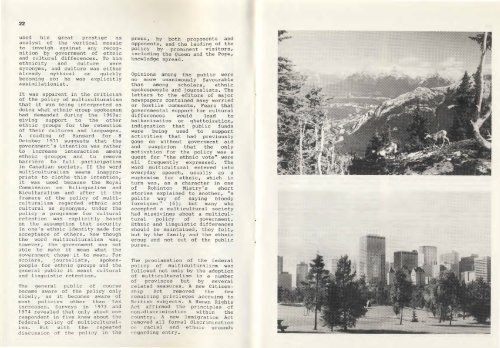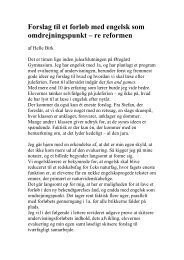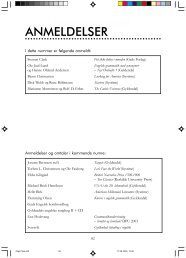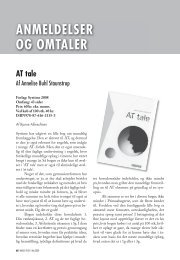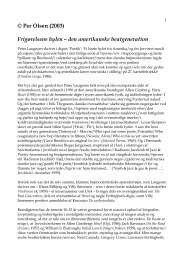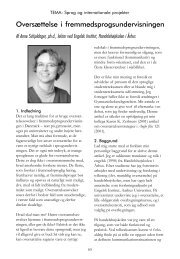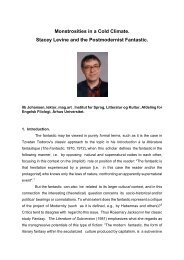REDAKTIONELT - Anglo Files
REDAKTIONELT - Anglo Files
REDAKTIONELT - Anglo Files
You also want an ePaper? Increase the reach of your titles
YUMPU automatically turns print PDFs into web optimized ePapers that Google loves.
22<br />
used his great prestige as<br />
analyst of the vertical mosaic<br />
to inveigh against any recognition<br />
by government of ethnic<br />
and cultural differences. To him<br />
ethnicity and culture were<br />
synonyms, and culture was either<br />
already mythical or quickly<br />
becoming so: he was explicitly<br />
assimilationist.<br />
It was apparent in the criticism<br />
of the policy of multiculturalism<br />
that it was being interpreted as<br />
doing what ethnic group spokesmen<br />
had demanded during the 1960s:<br />
giving support to the other<br />
ethnic groups for the retention<br />
of their cultures and languages.<br />
A reading of Hansard for 8<br />
October 1971 suggests that the<br />
government's intention was rather<br />
to increase interaction among<br />
ethnic groupps and to remove<br />
barriers to full participation<br />
in Canadian society. If the word<br />
multiculturalism seems inappropriate<br />
to clothe this intention,<br />
it was used because the Royal<br />
Commission on Bilingualism and<br />
Biculturalism and after it the<br />
framers of the policy of multiculturalism<br />
regarded ethnic and<br />
cultural as synonyms. Under the<br />
policy a programme for cultural<br />
retention was explicitly based<br />
on the assumption that security<br />
in one's ethnic identity made for<br />
acceptance of others. New though<br />
the word multiculturalism was,<br />
however, the government was not<br />
able to make it mean what the<br />
government chose it to mean. For<br />
scolars, journalists, spokespeople<br />
for ethnic groups and the<br />
general public it meant cultural<br />
and linguistic retention.<br />
The general public of course<br />
became aware of the policy only<br />
slowly, as it becomes aware of<br />
most policies other than tax<br />
increases. Surveys in 1973 and<br />
1974 revealed that only about one<br />
respondent in five knew about the<br />
federal policy of multiculturalism.<br />
But with the repeated<br />
discussion of the policy in the<br />
press, by both proponents and<br />
opponents, and the lauding of the<br />
policy by prominent visitors,<br />
including the Queen and the Pope,<br />
knowledge spread.<br />
Opinions among the public were<br />
no more unanimously favourable<br />
than among scholars, ethnic<br />
spokespeople and journalists. The<br />
letters to the editors of major<br />
newspapers contained many worried<br />
or hostile comments. Fears that<br />
governmental support for cultural<br />
differences would lead to<br />
balkanization or ghettoization,<br />
indignation that public funds<br />
were being used to support<br />
activities that had previously<br />
gone on without government aid<br />
and suspicion that the only<br />
motivation for the policy was a<br />
quest for "the ethnic vote" were<br />
all frequently expressed. The<br />
word multicultural entered into<br />
everyday speech, usually as a<br />
euphemism for ethnic, which in<br />
turn was, as a character in one<br />
of Rohinton Mistry's short<br />
stories explained to another, "a<br />
polite way of saying bloody<br />
foreigner" (6); but many who<br />
accepted a multicultural society<br />
had misgivings about a multicultural<br />
policy of government.<br />
Ethnic and linguistic differences<br />
should be maintained, they felt,<br />
but by the family and the ethnic<br />
group and not out of the public<br />
purse.<br />
The proclamation of the federal<br />
policy of multiculturalism was<br />
followed not only by the adoption<br />
of multiculturalism in a number<br />
of provinces but by several<br />
related measures. A new Citizenship<br />
Act removed the few<br />
remaining privileges accruing to<br />
British subjects. A Human Rights<br />
Act affirmed the principles of<br />
non-discrimination within the<br />
country. A new Immigration Act<br />
removed all formal discrimination<br />
on racial and ethnic grounds<br />
regarding entry.


